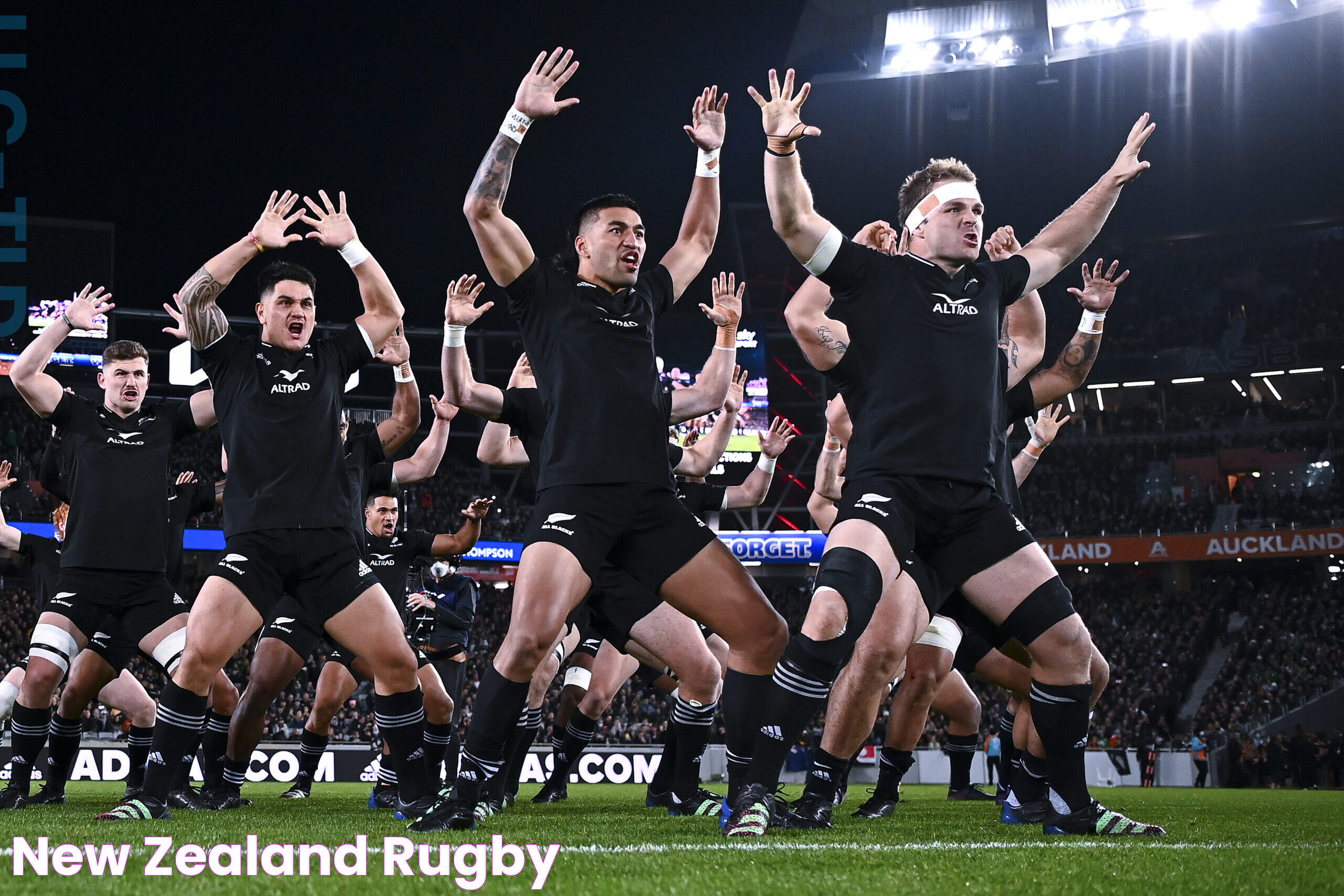New Zealand, a country renowned for its breathtaking landscapes and diverse culture, is equally celebrated for its formidable rugby teams. The nation has a rich history in the sport, with rugby being an integral part of its cultural identity. The New Zealand rugby teams are known for their exceptional skills, strategic gameplay, and an unwavering spirit that has captivated fans worldwide.
The rugby teams in New Zealand have consistently dominated the international rugby scene, showcasing their prowess in various tournaments and championships. The All Blacks, the national team, is one of the most successful teams in rugby history, known for their iconic haka and unrivaled performance on the field. Additionally, New Zealand boasts numerous regional teams that contribute to the robust rugby culture, including the Crusaders, Hurricanes, and Chiefs, each with its own unique style and legacy.
New Zealand's approach to rugby is deeply rooted in tradition and innovation. The country's commitment to nurturing young talent through comprehensive training programs and grassroots initiatives has cemented its position as a global leader in rugby. The rugby teams are not just sports entities; they are symbols of national pride and unity, inspiring future generations to pursue excellence in the sport.
Read also:The Historical Significance And Modern Relevance Of Fort Belvoir
Table of Contents
- The History of New Zealand Rugby
- The All Blacks: New Zealand's Pride
- Key Regional Teams in New Zealand
- How Does New Zealand Develop Rugby Talent?
- Training Programs and Facilities
- What is the Significance of the Haka?
- Performance in International Competitions
- Women in New Zealand Rugby
- Youth Rugby in New Zealand
- Rugby Culture and Community Engagement
- What Does the Future Hold for New Zealand Rugby?
- Challenges Facing New Zealand Rugby Teams
- The Passionate Fan Base of New Zealand Rugby
- Frequently Asked Questions
- Conclusion
The History of New Zealand Rugby
Rugby in New Zealand dates back to the late 19th century, with the first recorded game played in 1870. The sport quickly gained popularity, becoming an essential part of New Zealand's cultural fabric. The New Zealand Rugby Union was established in 1892, laying the foundation for the development and organization of rugby in the country. Over the years, New Zealand rugby teams have evolved, showcasing exceptional talent and innovation, contributing to their global reputation as rugby powerhouses.
The All Blacks: New Zealand's Pride
The All Blacks are New Zealand's national rugby team and one of the most successful teams in the history of the sport. Known for their distinctive black uniforms and the traditional haka performed before each match, the All Blacks have become a symbol of excellence and sportsmanship. Their strategic gameplay, physical prowess, and relentless pursuit of victory have earned them numerous titles and accolades, making them a formidable force on the international stage.
Key Regional Teams in New Zealand
New Zealand's rugby landscape is dotted with regional teams that contribute significantly to the sport's vitality. These teams participate in domestic competitions such as the Super Rugby and the Mitre 10 Cup, showcasing local talent and fostering a competitive spirit. Notable regional teams include:
- Crusaders: Based in Christchurch, the Crusaders are one of the most successful teams in Super Rugby history, known for their disciplined approach and tactical brilliance.
- Hurricanes: Representing the Wellington region, the Hurricanes are celebrated for their dynamic playing style and passionate fan base.
- Chiefs: Based in Hamilton, the Chiefs have a reputation for their aggressive gameplay and have consistently performed well in domestic and international competitions.
How Does New Zealand Develop Rugby Talent?
The development of rugby talent in New Zealand is a well-structured process that begins at the grassroots level. The country has a comprehensive system in place that identifies and nurtures young players from an early age. Schools and clubs across the nation offer programs that focus on skill development, sportsmanship, and teamwork, laying the groundwork for future success. This grassroots approach has been instrumental in producing world-class players who excel on both national and international stages.
Training Programs and Facilities
New Zealand's commitment to excellence in rugby is reflected in its state-of-the-art training programs and facilities. The country invests heavily in ensuring that players have access to the best resources, including top-notch coaches, nutritionists, and sports psychologists. Training programs are designed to enhance physical fitness, technical skills, and mental resilience, preparing players for the demands of competitive rugby. These programs have been pivotal in maintaining New Zealand's dominance in the sport.
What is the Significance of the Haka?
The haka is a traditional Maori war dance that has become synonymous with New Zealand rugby, particularly the All Blacks. Performed before matches, the haka is a powerful expression of Maori culture and heritage, symbolizing strength, unity, and determination. It serves as a psychological tool to intimidate opponents and rally the team, reinforcing their resolve to succeed. The haka's significance extends beyond rugby, representing a deep connection to New Zealand's cultural identity and history.
Read also:Cardi Bs Dazzling Piercing Style A Dive Into Her Iconic Look
Performance in International Competitions
New Zealand rugby teams have consistently excelled in international competitions, earning a reputation as one of the strongest rugby nations. The All Blacks, in particular, have dominated tournaments like the Rugby World Cup, securing multiple titles and setting numerous records. Their strategic gameplay, coupled with their ability to adapt to different playing conditions, has been key to their success. New Zealand's performance on the global stage continues to inspire admiration and respect from rugby enthusiasts worldwide.
Women in New Zealand Rugby
Women's rugby in New Zealand has gained significant momentum in recent years, with the national team, the Black Ferns, achieving remarkable success. The Black Ferns have won multiple Rugby World Cup titles, showcasing their skills and dedication. New Zealand's commitment to promoting women's rugby is evident in the growing number of clubs and competitions dedicated to female players. This progress reflects the country's broader efforts to ensure inclusivity and diversity in the sport.
Youth Rugby in New Zealand
Youth rugby is a crucial component of New Zealand's rugby ecosystem, serving as a pipeline for future talent. Schools and clubs offer various programs that cater to young players, emphasizing skill development, teamwork, and sportsmanship. These programs play a vital role in fostering a love for the game and encouraging participation from an early age. The focus on youth rugby ensures a steady supply of talented players who are well-prepared to advance to higher levels of competition.
Rugby Culture and Community Engagement
Rugby is more than just a sport in New Zealand; it is a way of life that brings communities together. The country's rugby culture is characterized by passionate support, community involvement, and a deep appreciation for the game's values. Rugby matches are social events that foster camaraderie and pride, with fans rallying behind their teams with unwavering enthusiasm. Community engagement initiatives, such as rugby clinics and outreach programs, further strengthen the bond between rugby teams and their supporters.
What Does the Future Hold for New Zealand Rugby?
The future of New Zealand rugby looks promising, with continued investment in talent development, training facilities, and community engagement. The country's commitment to innovation and adaptation ensures that its rugby teams remain competitive on the global stage. As new generations of players emerge, New Zealand rugby is poised to maintain its legacy of excellence and inspire future athletes to pursue greatness in the sport.
Challenges Facing New Zealand Rugby Teams
Despite their success, New Zealand rugby teams face several challenges that require strategic solutions. These include player retention, competition from other sports, and the need to adapt to evolving playing styles. Additionally, maintaining a balance between tradition and innovation is crucial for the sport's continued growth. Overcoming these challenges will require collaboration between stakeholders, investment in resources, and a commitment to preserving the essence of New Zealand rugby.
The Passionate Fan Base of New Zealand Rugby
The fan base of New Zealand rugby is one of its greatest assets, characterized by unwavering loyalty and enthusiasm. Fans play a pivotal role in supporting their teams, creating an electrifying atmosphere at matches and fostering a sense of community. The connection between fans and teams is mutual, with players often acknowledging the impact of their supporters on their performance. This passionate fan base is a testament to the enduring appeal of rugby in New Zealand.
Frequently Asked Questions
1. What makes New Zealand rugby teams so successful?
The success of New Zealand rugby teams can be attributed to a combination of factors, including a strong rugby culture, comprehensive training programs, and a focus on talent development from an early age. The country's commitment to innovation and strategic gameplay also plays a significant role in their achievements.
2. How is the haka performed by New Zealand rugby teams?
The haka is a traditional Maori war dance performed by New Zealand rugby teams, particularly the All Blacks, before matches. It involves a series of movements, chants, and expressions that symbolize strength, unity, and determination.
3. What are some of the key regional rugby teams in New Zealand?
Some of the key regional rugby teams in New Zealand include the Crusaders, Hurricanes, and Chiefs. These teams participate in domestic competitions and contribute significantly to the country's vibrant rugby culture.
4. How does New Zealand promote women's rugby?
New Zealand promotes women's rugby through dedicated clubs, competitions, and support for female players. The national team, the Black Ferns, has achieved remarkable success, inspiring more women to participate in the sport.
5. What challenges do New Zealand rugby teams face?
Challenges facing New Zealand rugby teams include player retention, competition from other sports, and the need to adapt to evolving playing styles. Addressing these challenges requires strategic solutions and collaboration among stakeholders.
6. How does youth rugby contribute to New Zealand's rugby success?
Youth rugby plays a crucial role in developing future talent, with schools and clubs offering programs that focus on skill development and sportsmanship. These initiatives ensure a steady supply of skilled players for higher levels of competition.
Conclusion
New Zealand rugby teams are a dynamic force in the world of rugby, known for their exceptional performance, cultural significance, and enduring legacy. The country's commitment to excellence, innovation, and community engagement has cemented its position as a global leader in the sport. As New Zealand rugby continues to evolve, it remains a source of national pride and inspiration for future generations.

